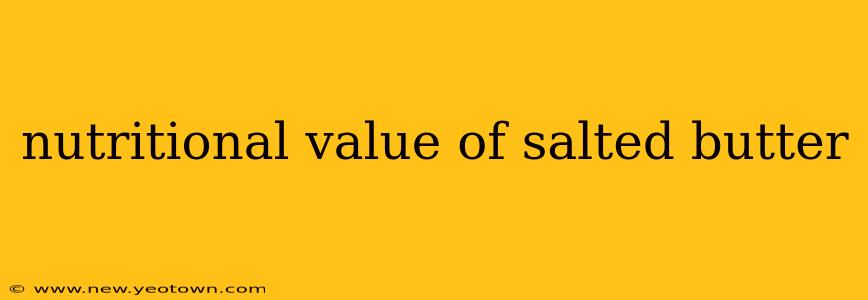Butter. Just the word conjures images of golden-brown toast, flaky pastries, and rich, creamy sauces. But beyond its culinary appeal, what's the real nutritional story behind this beloved staple, especially when it comes to the salted variety? Let's dive in.
It's important to preface this by saying that butter, whether salted or unsalted, is a high-fat food. Moderation is key. But understanding its nutritional profile empowers us to make informed choices about its place in a balanced diet.
What are the main nutrients in salted butter?
Salted butter is essentially unsalted butter with added salt. Therefore, the core nutritional components remain the same, with the addition of sodium. The primary nutrient is fat, specifically saturated fat. While saturated fat has received a bad rap in the past, current dietary guidelines recognize that it's not the sole villain in heart health. It's the overall dietary pattern that matters most. Butter also contains smaller amounts of:
- Vitamins: Butter is a source of fat-soluble vitamins like vitamin A and vitamin E, crucial for vision, immune function, and antioxidant protection.
- Minerals: It contains trace amounts of minerals like calcium and potassium.
How does the salt in salted butter affect its nutritional profile?
The addition of salt significantly impacts one aspect: sodium content. Sodium is essential for various bodily functions, but excessive intake can contribute to high blood pressure and other health problems. Therefore, individuals watching their sodium intake should be mindful of their butter consumption. Unsalted butter offers a way to control sodium intake more precisely.
Is salted butter healthier than unsalted butter?
This is a common question, and the answer is nuanced. From a purely nutritional standpoint, unsalted butter generally offers a slight edge because it allows for better control over sodium intake. However, the difference in overall nutritional value between salted and unsalted butter is minimal. The choice often comes down to personal preference and dietary needs.
What are the health benefits of salted butter (in moderation)?
While butter is high in saturated fat, consuming it in moderation as part of a balanced diet doesn't necessarily equate to negative health outcomes for everyone. Some potential benefits, when consumed sparingly, include:
- Source of fat-soluble vitamins: As mentioned, butter provides vitamins A and E, which play vital roles in overall health.
- Improved nutrient absorption: Fat aids in the absorption of certain nutrients from other foods.
What are the potential health risks of salted butter?
The primary concern with salted butter is its high saturated fat and sodium content. Excessive intake of saturated fat can contribute to high cholesterol levels, potentially increasing the risk of heart disease. High sodium intake is linked to high blood pressure.
How much salted butter should I eat per day?
There's no single definitive answer, as individual needs and tolerances vary. However, dietary guidelines generally advise limiting saturated fat intake and being mindful of sodium consumption. Using butter sparingly and exploring healthier alternatives for cooking and spreading are prudent strategies.
Is salted butter bad for your cholesterol?
The impact of salted butter on cholesterol levels depends on several factors, including individual genetic predisposition, overall diet, and activity level. While butter is high in saturated fat, which can raise LDL ("bad") cholesterol, research is ongoing and indicates it's not the sole culprit in cholesterol management. A balanced diet and lifestyle are far more influential.
Can I use salted butter for baking?
Yes, you can use salted butter for baking. However, many recipes specifically call for unsalted butter to allow for precise control over the salt content in the final product. If a recipe calls for unsalted butter, using salted butter might result in a saltier final product.
This exploration of salted butter's nutritional value underscores the importance of balance and moderation in our diets. While it's a delicious and versatile ingredient, mindful consumption is key to enjoying its culinary benefits without compromising overall health. Remember to consult with a healthcare professional or registered dietitian for personalized dietary advice.

